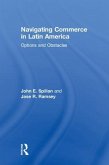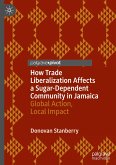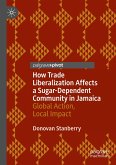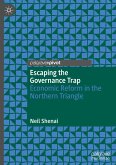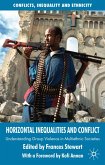- Gebundenes Buch
- Merkliste
- Auf die Merkliste
- Bewerten Bewerten
- Teilen
- Produkt teilen
- Produkterinnerung
- Produkterinnerung
The book informs academic as well as non-academic audiences about regional developments in the Americas, in particular those dating back to the last twenty years. Beyond the primary purpose of summarizing the hemisphere's recent trends, the book also brings clarification in a detailed but easy to understand way about timely issues regarding the institutionalisation, or lack thereof, of the plethora of regional and sub-regional bodies that have emerged in this hemisphere over the past couple of decades.
Andere Kunden interessierten sich auch für
![Navigating Commerce in Latin America Navigating Commerce in Latin America]() John E SpillanNavigating Commerce in Latin America197,99 €
John E SpillanNavigating Commerce in Latin America197,99 €![How Trade Liberalization Affects a Sugar Dependent Community in Jamaica How Trade Liberalization Affects a Sugar Dependent Community in Jamaica]() Donovan StanberryHow Trade Liberalization Affects a Sugar Dependent Community in Jamaica82,99 €
Donovan StanberryHow Trade Liberalization Affects a Sugar Dependent Community in Jamaica82,99 €![How Trade Liberalization Affects a Sugar Dependent Community in Jamaica How Trade Liberalization Affects a Sugar Dependent Community in Jamaica]() Donovan StanberryHow Trade Liberalization Affects a Sugar Dependent Community in Jamaica82,99 €
Donovan StanberryHow Trade Liberalization Affects a Sugar Dependent Community in Jamaica82,99 €![Volkswagen in the Amazon Volkswagen in the Amazon]() Antoine AckerVolkswagen in the Amazon33,99 €
Antoine AckerVolkswagen in the Amazon33,99 €![Escaping the Governance Trap Escaping the Governance Trap]() Neil ShenaiEscaping the Governance Trap53,49 €
Neil ShenaiEscaping the Governance Trap53,49 €![Horizontal Inequalities and Conflict Horizontal Inequalities and Conflict]() Horizontal Inequalities and Conflict75,99 €
Horizontal Inequalities and Conflict75,99 €![Citizen¿s Income and Welfare Regimes in Latin America Citizen¿s Income and Welfare Regimes in Latin America]() Citizen¿s Income and Welfare Regimes in Latin America75,99 €
Citizen¿s Income and Welfare Regimes in Latin America75,99 €-
-
-
The book informs academic as well as non-academic audiences about regional developments in the Americas, in particular those dating back to the last twenty years. Beyond the primary purpose of summarizing the hemisphere's recent trends, the book also brings clarification in a detailed but easy to understand way about timely issues regarding the institutionalisation, or lack thereof, of the plethora of regional and sub-regional bodies that have emerged in this hemisphere over the past couple of decades.
Hinweis: Dieser Artikel kann nur an eine deutsche Lieferadresse ausgeliefert werden.
Hinweis: Dieser Artikel kann nur an eine deutsche Lieferadresse ausgeliefert werden.
Produktdetails
- Produktdetails
- Verlag: Taylor & Francis
- Seitenzahl: 434
- Erscheinungstermin: 21. April 2014
- Englisch
- Abmessung: 234mm x 156mm x 25mm
- Gewicht: 789g
- ISBN-13: 9781409464020
- ISBN-10: 1409464024
- Artikelnr.: 41247111
- Herstellerkennzeichnung
- Libri GmbH
- Europaallee 1
- 36244 Bad Hersfeld
- gpsr@libri.de
- Verlag: Taylor & Francis
- Seitenzahl: 434
- Erscheinungstermin: 21. April 2014
- Englisch
- Abmessung: 234mm x 156mm x 25mm
- Gewicht: 789g
- ISBN-13: 9781409464020
- ISBN-10: 1409464024
- Artikelnr.: 41247111
- Herstellerkennzeichnung
- Libri GmbH
- Europaallee 1
- 36244 Bad Hersfeld
- gpsr@libri.de
W. Andy Knight is Director of the Institute of International Relations (IIR) at The University of the West Indies and Professor and former Chair of the Department of Political Science at the University of Alberta. He served as Governor of the International Development Research Centre (IDRC) from 2007 to 2012, co-edited Global Governance journal from 2000 to 2005 and was Vice Chair of the Academic Council on the United Nations System (ACUNS). Knight has written and edited several books, book chapters and journal articles on various aspects of multilateralism, global governance and peace, and United Nations reform. His recent books include: The Routledge Handbook of the Responsibility to Protect (with Frazer Egerton) -Routledge 2012; Towards the Dignity of Difference?: Neither 'end of History' Nor 'clash of Civilizations' (with Mojtaba Mahdavi) - Ashgate 2012; and Global Politics (with Tom Keating) - Oxford University Press 2010. Professor Knight is a Fellow of the Royal Society of Canada. Julián Castro-Rea (PhD, Université de Montréal) is Associate Professor of Political Science, University of Alberta. His main area of research interest is North American politics (Canada, Mexico, and the United States), both from comparative and trilateral perspectives and he has written extensively on this topic in the three official languages of North America. Among his most recent publications are: Our North America: Social and Political Issues beyond NAFTA (Ashgate, 2012); Le gâchis qu'ils ont fait : comment la droite a ruiné les politiques publiques en Amérique du Nord Â' in Bulletin d'histoire politique, vol. 21, no. 1, fall 2012, pp. 139-149; and Common Sense or Collusion? Business Interests behind North American Deep Integration?, in Fox, Michael and Andrew Nurse, eds., Dynamics and Trajectories: Canada and North America (Fernwood, 2012), pp. 144-160. Hamid Ghany is former Dean of the Faculty of Social Sciences at The University of the West Indies, St. Au
Part I Backdrop; Chapter 1 Re-mapping the Americas, W. Andy Knight, Julián
Castro-Rea, Hamid Ghany; Chapter 2 Regional and Global Governance: Theory
and Practice in the Caribbean, Vaughan A. Lewis; Part II Hegemony,
Regionalization and the Changing Hemisphere; Chapter 3 The FTAA and its
Untimely Demise; Chapter 4 Free Trade: A Tool for US Hegemony in the
Americas, Julián Castro-Rea; Chapter 5 Re-mapping Trade Relations in the
Americas: The Influence of Shifting Power, Gaspare M. Genna; Chapter 6
CARICOM's Engagement with Latin America: The Community of Latin American
and Caribbean States (CELAC), its Promise and Challenges, Mark Kirton;
Chapter 7 Latin America in China's Peaceful Rise, Joseph Y.S. Cheng;
Chapter 8 Assessing the Developmental Potential of the FTAA and EPA for
Small Developing States, Patsy Lewis; Chapter 9 Whither CARICOM?, Matthew
Louis Bishop; Part III Regional Security, Governance and Multilateralism;
Chapter 10 The Political Economy of Post-9/11 US Security in Latin America:
Has Anything Really Changed?, Greg Anderson; Chapter 11 The Constitutional
and Political Aspects of Strategic Culture in Trinidad and Tobago, Hamid
Ghany; Chapter 12 From Engagement to Influence: Civil Society Participation
in the EPA Trade Negotiations and Regional Integration Processes, Annita
Montoute; Chapter 13 Caribbean Integration: Can Cultural Production Succeed
where Politics and Economics have Failed? (Confessions of a Wayward
Economist), Norman Girvan; Chapter 14 Liberalization of Fair Trade or
Globalization of Human (In)security? Protecting Public Goods in the
Emerging Economic Integration of the Americas, Obijiofor Aginam; Chapter 15
The Dynamics, Limits and Potential of Formal Liberal Democracy in Latin
America, Fred Judson; Chapter 16 Why Democracy and the Free Market are Good
for Caudillos : The Nicaragua Case, Kalowatie Deonandan; Chapter 17
Conclusions, W. Andy Knight, Julián Castro-Rea, Hamid Ghany;
Castro-Rea, Hamid Ghany; Chapter 2 Regional and Global Governance: Theory
and Practice in the Caribbean, Vaughan A. Lewis; Part II Hegemony,
Regionalization and the Changing Hemisphere; Chapter 3 The FTAA and its
Untimely Demise; Chapter 4 Free Trade: A Tool for US Hegemony in the
Americas, Julián Castro-Rea; Chapter 5 Re-mapping Trade Relations in the
Americas: The Influence of Shifting Power, Gaspare M. Genna; Chapter 6
CARICOM's Engagement with Latin America: The Community of Latin American
and Caribbean States (CELAC), its Promise and Challenges, Mark Kirton;
Chapter 7 Latin America in China's Peaceful Rise, Joseph Y.S. Cheng;
Chapter 8 Assessing the Developmental Potential of the FTAA and EPA for
Small Developing States, Patsy Lewis; Chapter 9 Whither CARICOM?, Matthew
Louis Bishop; Part III Regional Security, Governance and Multilateralism;
Chapter 10 The Political Economy of Post-9/11 US Security in Latin America:
Has Anything Really Changed?, Greg Anderson; Chapter 11 The Constitutional
and Political Aspects of Strategic Culture in Trinidad and Tobago, Hamid
Ghany; Chapter 12 From Engagement to Influence: Civil Society Participation
in the EPA Trade Negotiations and Regional Integration Processes, Annita
Montoute; Chapter 13 Caribbean Integration: Can Cultural Production Succeed
where Politics and Economics have Failed? (Confessions of a Wayward
Economist), Norman Girvan; Chapter 14 Liberalization of Fair Trade or
Globalization of Human (In)security? Protecting Public Goods in the
Emerging Economic Integration of the Americas, Obijiofor Aginam; Chapter 15
The Dynamics, Limits and Potential of Formal Liberal Democracy in Latin
America, Fred Judson; Chapter 16 Why Democracy and the Free Market are Good
for Caudillos : The Nicaragua Case, Kalowatie Deonandan; Chapter 17
Conclusions, W. Andy Knight, Julián Castro-Rea, Hamid Ghany;
Part I Backdrop; Chapter 1 Re-mapping the Americas, W. Andy Knight, Julián
Castro-Rea, Hamid Ghany; Chapter 2 Regional and Global Governance: Theory
and Practice in the Caribbean, Vaughan A. Lewis; Part II Hegemony,
Regionalization and the Changing Hemisphere; Chapter 3 The FTAA and its
Untimely Demise; Chapter 4 Free Trade: A Tool for US Hegemony in the
Americas, Julián Castro-Rea; Chapter 5 Re-mapping Trade Relations in the
Americas: The Influence of Shifting Power, Gaspare M. Genna; Chapter 6
CARICOM's Engagement with Latin America: The Community of Latin American
and Caribbean States (CELAC), its Promise and Challenges, Mark Kirton;
Chapter 7 Latin America in China's Peaceful Rise, Joseph Y.S. Cheng;
Chapter 8 Assessing the Developmental Potential of the FTAA and EPA for
Small Developing States, Patsy Lewis; Chapter 9 Whither CARICOM?, Matthew
Louis Bishop; Part III Regional Security, Governance and Multilateralism;
Chapter 10 The Political Economy of Post-9/11 US Security in Latin America:
Has Anything Really Changed?, Greg Anderson; Chapter 11 The Constitutional
and Political Aspects of Strategic Culture in Trinidad and Tobago, Hamid
Ghany; Chapter 12 From Engagement to Influence: Civil Society Participation
in the EPA Trade Negotiations and Regional Integration Processes, Annita
Montoute; Chapter 13 Caribbean Integration: Can Cultural Production Succeed
where Politics and Economics have Failed? (Confessions of a Wayward
Economist), Norman Girvan; Chapter 14 Liberalization of Fair Trade or
Globalization of Human (In)security? Protecting Public Goods in the
Emerging Economic Integration of the Americas, Obijiofor Aginam; Chapter 15
The Dynamics, Limits and Potential of Formal Liberal Democracy in Latin
America, Fred Judson; Chapter 16 Why Democracy and the Free Market are Good
for Caudillos : The Nicaragua Case, Kalowatie Deonandan; Chapter 17
Conclusions, W. Andy Knight, Julián Castro-Rea, Hamid Ghany;
Castro-Rea, Hamid Ghany; Chapter 2 Regional and Global Governance: Theory
and Practice in the Caribbean, Vaughan A. Lewis; Part II Hegemony,
Regionalization and the Changing Hemisphere; Chapter 3 The FTAA and its
Untimely Demise; Chapter 4 Free Trade: A Tool for US Hegemony in the
Americas, Julián Castro-Rea; Chapter 5 Re-mapping Trade Relations in the
Americas: The Influence of Shifting Power, Gaspare M. Genna; Chapter 6
CARICOM's Engagement with Latin America: The Community of Latin American
and Caribbean States (CELAC), its Promise and Challenges, Mark Kirton;
Chapter 7 Latin America in China's Peaceful Rise, Joseph Y.S. Cheng;
Chapter 8 Assessing the Developmental Potential of the FTAA and EPA for
Small Developing States, Patsy Lewis; Chapter 9 Whither CARICOM?, Matthew
Louis Bishop; Part III Regional Security, Governance and Multilateralism;
Chapter 10 The Political Economy of Post-9/11 US Security in Latin America:
Has Anything Really Changed?, Greg Anderson; Chapter 11 The Constitutional
and Political Aspects of Strategic Culture in Trinidad and Tobago, Hamid
Ghany; Chapter 12 From Engagement to Influence: Civil Society Participation
in the EPA Trade Negotiations and Regional Integration Processes, Annita
Montoute; Chapter 13 Caribbean Integration: Can Cultural Production Succeed
where Politics and Economics have Failed? (Confessions of a Wayward
Economist), Norman Girvan; Chapter 14 Liberalization of Fair Trade or
Globalization of Human (In)security? Protecting Public Goods in the
Emerging Economic Integration of the Americas, Obijiofor Aginam; Chapter 15
The Dynamics, Limits and Potential of Formal Liberal Democracy in Latin
America, Fred Judson; Chapter 16 Why Democracy and the Free Market are Good
for Caudillos : The Nicaragua Case, Kalowatie Deonandan; Chapter 17
Conclusions, W. Andy Knight, Julián Castro-Rea, Hamid Ghany;


